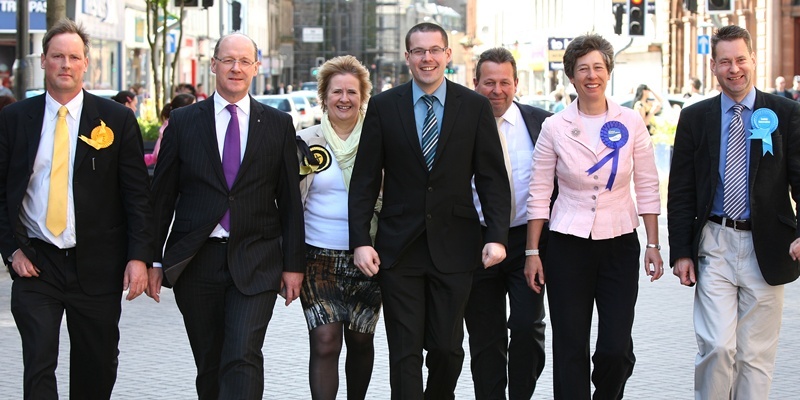Candidates vying for two newly-formed Scottish Parliamentary constituencies have been put under the spotlight at the latest Courier hustings in Perth.
Mr Robertson said the Lib Dems had fought hard to scrap tuition fees. “The thought of people leaving university with debts of £30,000 to £50,000 appals me,” he said. “We have fought all the way to stop that happening. Our future is our young people.”
Roseanna Cunningham said the issue was about what was perceived as best for society. “I have always thought access to education should be free. That is expensive it comes at a cost,” she said, putting education in the same category as the NHS.
Mr Cheema said the exact cost of tuition fees was unclear and required a “root and branch review.”
Perthshire Chamber of Commerce president Stephen Leckie asked what had to be done in Perthshire to make people want to live and work there.
Murdo Fraser said Perthshire enjoyed many benefits an excellent location and the recent university status for Perth College among them but city status, better rail connections, dualling of the A9 to Inverness and massive improvements in the broadband service would all be steps in the right direction.
Rail improvements and helping companies move their goods by freight were vital, according to Mr Robertson, who attacked the SNP Government’s record on the issue.
Mr Swinney said the financial assistance for freight had been made available but he couldn’t force private companies to spend it. He said there were more rail services between Perth and Edinburgh than four years ago, £50m had been spent improving key junctions on the A9 in recent years, and a dualling strategy was in place.
Gordon Campbell asked what the candidates would do to minimise the effects of alcohol abuse in Scotland.
Ms Cunningham said the idea of minimum pricing had received widespread support but the issue was complex, with alcohol permeating Scottish culture, and education had to begin at an early age.
“I doubt there is a single family in this country that doesn’t have somebody in the wider family who has a serious problem with alcohol,” she said. “We have to deal with that. We are almost mesmerised by it.”
She said this didn’t mean nothing could be done. Drink culture had changed in the past 20 years with easy access to cheap alcohol something that could be reversed.
Mr Clements agreed on the complexity of tackling alcohol misuse but thought it could be best achieved at UK level so that minimum pricing would not mean a different situation existed on each side of the border.
Mr Cheema argued that minimum pricing was not the answer the culture had to be looked at.
Mr Swinney said that while it cost £44 to consume a bottle of vodka in pub measures, supermarkets were selling a bottle for £10, with alcohol “cheaper than water” in some circumstances.
Education was the key, according to Liz Smith, who said she had been very impressed with innovative education on alcohol abuse which had hammered the message home in schools. “That message is very powerful,” she said.
The importance of maintaining arts funding at a local level, and the economic benefits to Perthshire from the arts, were touched on during the debate, as was the importance of producing manifesto promises that could be delivered.
Following a boundary review, the old Perth constituency created at the same time as the Scottish Parliament has made way for Perthshire North and the constituency of Perthshire South and Kinross-shire.
On Tuesday night The Courier and Perthshire Chamber of Commerce staged a joint event where voters in Perth and Kinross were given the chance to quiz their candidates.
Courier political reporter David Clegg acted as chairman. Joining him on the stage at the Soutar Theatre in the A. K. Bell Library were the candidates:
Perthshire North:Pete Cheema (Scottish Labour Party)Victor Clements (Scottish Liberal Democrats)Murdo Fraser (Scottish Conservative and Unionist Party)John Swinney (Scottish National Party)
Perthshire South and Kinross-shire: Roseanna Cunningham (Scottish National Party)Willie Robertson (Scottish Liberal Democrats)Elizabeth Smith (Scottish Conservative and Unionist Party)Tricia Duncan (Scottish Labour Party) was unable to attend due to illness.
The first question, by Marjorie Clark, was how the most vulnerable could be protected from cutbacks. It was a goal Mr Swinney described as “fundamental to this election” and which he said would be achieved by supporting economic recovery, adequate training places to get people back into employment, cushioning as much as possible public services, and financial support of voluntary bodies.
Mr Fraser said it was an important question when the country was attempting to cope with a huge debt. While the Conservatives support a public-sector pay freeze, he stressed those earning under £21,000 would be excluded. He called for more stable financial settlements for the voluntary sector so they knew where they stood.
Labour’s focus would be on unemployment, according to Mr Cheema, who said that if each small business could only take on three more people, full employment would be created.
Victor Clements believed the answer lay in protecting services at a local level.
Tuition fees came up early, with Elizabeth Smith saying it was imperative Scotland’s universities and colleges and the education they provided was safeguarded, which meant a “modest and fair” graduate contribution was the way forward.
Continued…
